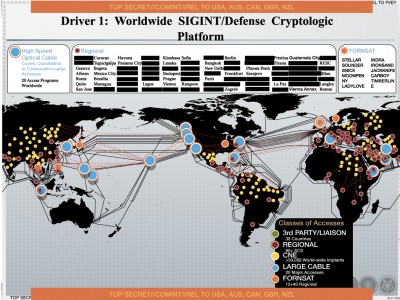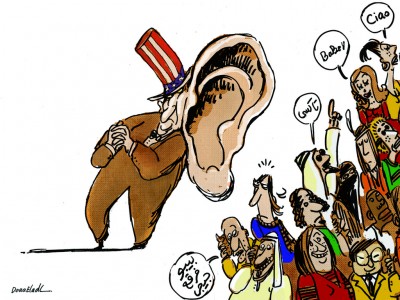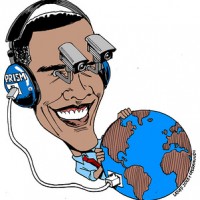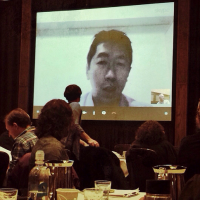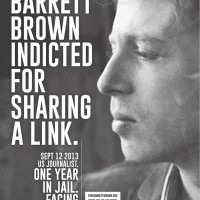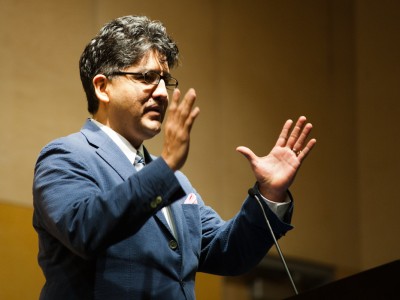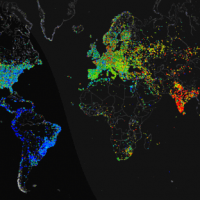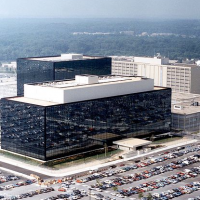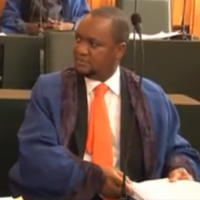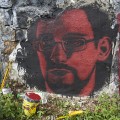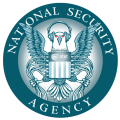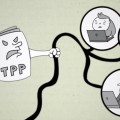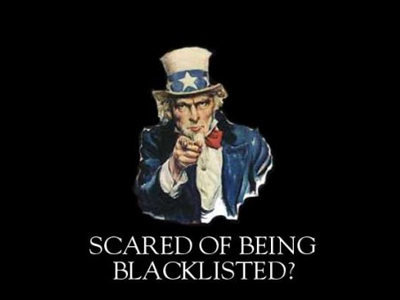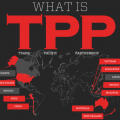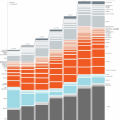Stories about North America
Get the Facts: 365 Days of Snowden Leaks
Since June 5, 2013, a lot has been uncovered about worldwide digital surveillance. Here's a round-up of some of the most significant things we've learned from the Snowden leaks.
365 Days of Snowden: This June 5, Say No to Surveillance
It has been nearly one year since the first Snowden leaks. This June 5, activists will be launching campaigns, lobbying legislators and holding live events to speak out against mass surveillance.
Web We Want Contest: Cartoonists Fight Back!
The Web We Want initiative challenged artists everywhere to produce cartoons on the topic of NSA surveillance, in support of #TheDayWeFightBack -- here are the winners!
Coursera Blocked in Syria — by US Sanctions [UPDATE]
The US federal government that has forced Coursera and other Massive Online Open Course providers to block access for users in sanctioned countries such as Syria and Iran.
2013 in Review: A Fireside Chat with EFF's Jillian York and Eva Galperin
NSA and FinFisher and drones, oh my! Was 2013 the "worst year for Internet freedom" to date? Jillian and Eva discuss.
Locked Up for Linking? US Journalist Faces Prosecution
Transparency activist and journalist Barrett Brown has been indicted for doing something many of us do every day: posting a link on the Internet.
Worried About Surveillance? Welcome to the Indian World, Says Sherman Alexie
Surveillance has always been present for Native Americans and minorities in the US, says Alexie. The NSA's spying program is only exposing the majority of the country to what others have long experienced.
US Power and the Not-So-Democratic Global Internet
The US government has a disproportionately large influence on global Internet policy. What if these policies don't work for the rest of the world?
How the NSA is Tampering with Encrypted Communications (and how to fight back)
New leaks show that the NSA has gone to extraordinary lengths to secretly undermine secure communications infrastructure online. EFF security experts explain what this means for users and what you can do to keep your online communications private.
Minister Wins Damages Against Zambian Gossip Website
In a US court, Zambia's Deputy Commerce Minister has won a lawsuit against Zambian gossip site Kachepa360. Critics fear that citizen media sites reporting on government activities may soon face similar challenges.
Why Would Edward Snowden Want to Go to Ecuador?
The future of Edward Snowden is uncertain. The young American is reportedly sheltered in Moscow's Sheremetyevo Airport, and he has requested asylum from 20 countries. Although it remains unknown where he will go from here, many wonder: Why might Snowden want to go to a country like Ecuador, where restrictions on press freedom appear to be on the rise?
VIDEO: Experts Speak on Role of Whistleblowers
The revelations of the recent NSA leaks are explosive, but Edward Snowden is not the first whistleblower to leak information to the public about government operations. Oxford-based project Free Speech Debate interviewed several former intelligence professionals and whistleblowers who discussed reasons for and against going public with sensitive information.
Everyone's Rights are at Stake: Global Reach of US Surveillance Programs
Last week's revelations about phone and Internet surveillance programs run by the US government's National Security Agency (NSA) sent shock waves throughout the United States and the western media, but also around the globe. While in the US, many privacy-minded lawmakers and even digital rights advocates used the news as an opportunity to demand better protections for Americans' online privacy, Internet users worldwide were left wondering how to protect their own data in the face of these threats.
US Spying Whistleblower Edward Snowden Takes Refuge in Hong Kong
The man behind the bombshell intelligence leaks that revealed top secret US phone and Internet surveillance programs said he fled to Hong Kong because they "have a spirited commitment to free speech and the right of political dissent". But some in Hong Kong aren't so sure about the government's willingness to him.
VIDEO: How the Trans-Pacific Partnership Could Hurt Internet Users
A new animated video explains how the Trans-Pacific Partnership (TPP), a massive trade agreement being negotiated by the United States and ten governments from around the Pacific region, could have alarming consequences for Internet users.
Copyright Amendment Could Bring Web Filter System to Taiwan
Many Taiwanese believe that a recent proposed copyright amendment put forward by the government is a setback for democracy. The amendment would provide legal ground for ISP-level blocking of websites that violate copyright restrictions.
Peruvians To President: Our Digital Rights Are Non-Negotiable
Peruvian NGOs have launched a campaign asking President Ollanta Humala Tasso to set clear, non-negotiable limitationss to ensure that Peruvians' fundamental rights in the TPP are respected. The treaty could threaten Internet user's rights to free expression and access to information online, increase controversial aspects of Peruvian copyright law, and restrict the ability of Peru's Congress to engage in domestic law reform to meet the evolving IP needs and realities of Peruvian citizens and their growing technology sector.
TPP: Biggest Threat to Global Internet Since ACTA?
The United States and ten governments from around the Pacific region will soon meet to hash out the Trans-Pacific Partnership trade agreement (TPP). Negotiations of the agreement have been secretive from the beginning of the process, but based on leaked documents and the undemocratic nature of the entire process, advocates have every reason to be alarmed about the copyright enforcement provisions contained in this multinational trade deal.
Human Rights Verdict Could Affect Cisco in China
In 2011, two separate lawsuits were filed against Cisco Systems alleging that its technology enabled the government of China to monitor, capture, and kill Chinese citizens for their views and beliefs. To what extent are these human rights violations attributable to technology provided by Cisco?
Victory for Transparency: Microsoft Reports on Government Requests for User Data
Last week Microsoft released its first transparency report, which covers all requests for user data from law enforcement and judicial authorities received in 2012. The report offers specific data on Skype, a particularly important step towards building trust with users who may be vulnerable to government surveillance, describes Microsoft's approach to complying with US law, as well as law enforcement and privacy laws in other countries.

